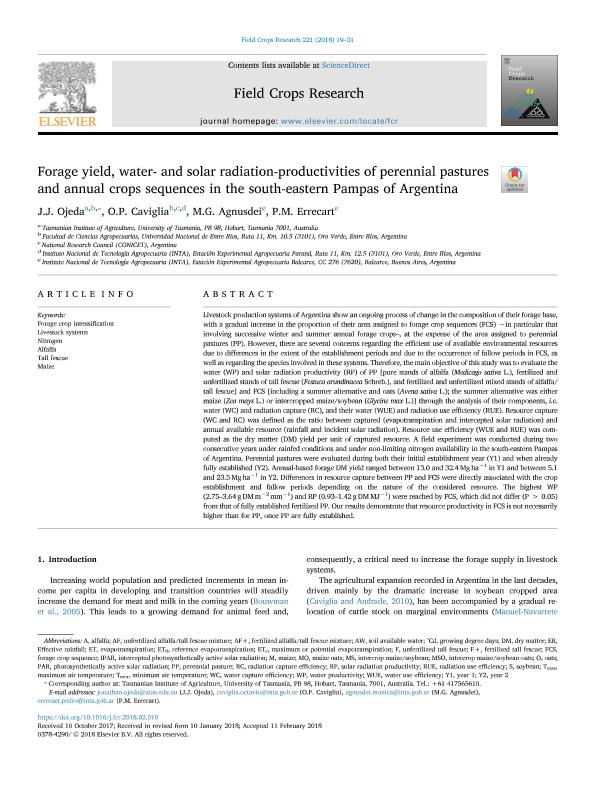Mostrar el registro sencillo del ítem
dc.contributor.author
Ojeda, J.J.
dc.contributor.author
Caviglia, Octavio Pedro

dc.contributor.author
Agnusdei, M.G.
dc.contributor.author
Errecart, P.M.
dc.date.available
2019-12-26T14:23:00Z
dc.date.issued
2018-05
dc.identifier.citation
Ojeda, J.J.; Caviglia, Octavio Pedro; Agnusdei, M.G.; Errecart, P.M.; Forage yield, water- and solar radiation-productivities of perennial pastures and annual crops sequences in the south-eastern Pampas of Argentina; Elsevier Science; Field Crops Research; 221; 5-2018; 19-31
dc.identifier.issn
0378-4290
dc.identifier.uri
http://hdl.handle.net/11336/92900
dc.description.abstract
Livestock production systems of Argentina show an ongoing process of change in the composition of their forage base, with a gradual increase in the proportion of their area assigned to forage crop sequences (FCS) −in particular that involving successive winter and summer annual forage crops– at the expense of the area assigned to perennial pastures (PP). However, there are several concerns regarding the efficient use of available environmental resources due to differences in the extent of the establishment periods and due to the occurrence of fallow periods in FCS, as well as regarding the species involved in these systems. Therefore, the main objective of this study was to evaluate the water (WP) and solar radiation productivity (RP) of PP [pure stands of alfalfa (Medicago sativa L.), fertilized and unfertilized stands of tall fescue (Festuca arundinacea Schreb.), and fertilized and unfertilized mixed stands of alfalfa/tall fescue] and FCS [including a summer alternative and oats (Avena sativa L.); the summer alternative was either maize (Zea mays L.) or intercropped maize/soybean (Glycine max L.)] through the analysis of their components, i.e. water (WC) and radiation capture (RC), and their water (WUE) and radiation use efficiency (RUE). Resource capture (WC and RC) was defined as the ratio between captured (evapotranspiration and intercepted solar radiation) and annual available resource (rainfall and incident solar radiation). Resource use efficiency (WUE and RUE) was computed as the dry matter (DM) yield per unit of captured resource. A field experiment was conducted during two consecutive years under rainfed conditions and under non-limiting nitrogen availability in the south-eastern Pampas of Argentina. Perennial pastures were evaluated during both their initial establishment year (Y1) and when already fully established (Y2). Annual-based forage DM yield ranged between 13.0 and 32.4 Mg ha−1 in Y1 and between 5.1 and 23.5 Mg ha−1 in Y2. Differences in resource capture between PP and FCS were directly associated with the crop establishment and fallow periods depending on the nature of the considered resource. The highest WP (2.75–3.64 g DM m−2 mm−1) and RP (0.93–1.42 g DM MJ−1) were reached by FCS, which did not differ (P > 0.05) from that of fully established fertilized PP. Our results demonstrate that resource productivity in FCS is not necessarily higher than for PP, once PP are fully established.
dc.format
application/pdf
dc.language.iso
eng
dc.publisher
Elsevier Science

dc.rights
info:eu-repo/semantics/openAccess
dc.rights.uri
https://creativecommons.org/licenses/by-nc-sa/2.5/ar/
dc.subject
ALFALFA
dc.subject
FORAGE CROP INTENSIFICATION
dc.subject
LIVESTOCK SYSTEMS
dc.subject
MAIZE
dc.subject
NITROGEN
dc.subject
TALL FESCUE
dc.subject.classification
Agricultura

dc.subject.classification
Agricultura, Silvicultura y Pesca

dc.subject.classification
CIENCIAS AGRÍCOLAS

dc.title
Forage yield, water- and solar radiation-productivities of perennial pastures and annual crops sequences in the south-eastern Pampas of Argentina
dc.type
info:eu-repo/semantics/article
dc.type
info:ar-repo/semantics/artículo
dc.type
info:eu-repo/semantics/publishedVersion
dc.date.updated
2019-12-20T22:57:40Z
dc.journal.volume
221
dc.journal.pagination
19-31
dc.journal.pais
Países Bajos

dc.journal.ciudad
Amsterdam
dc.description.fil
Fil: Ojeda, J.J.. University of Tasmania; Australia. Universidad Nacional de Entre Ríos; Argentina
dc.description.fil
Fil: Caviglia, Octavio Pedro. Universidad Nacional de Entre Ríos; Argentina. Consejo Nacional de Investigaciones Científicas y Técnicas; Argentina. Instituto Nacional de Tecnología Agropecuaria; Argentina
dc.description.fil
Fil: Agnusdei, M.G.. Instituto Nacional de Tecnología Agropecuaria; Argentina
dc.description.fil
Fil: Errecart, P.M.. Instituto Nacional de Tecnología Agropecuaria; Argentina
dc.journal.title
Field Crops Research

dc.relation.alternativeid
info:eu-repo/semantics/altIdentifier/url/http://linkinghub.elsevier.com/retrieve/pii/S0378429017316957
dc.relation.alternativeid
info:eu-repo/semantics/altIdentifier/doi/http://dx.doi.org/10.1016/j.fcr.2018.02.010
Archivos asociados
